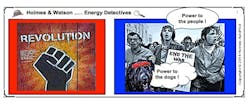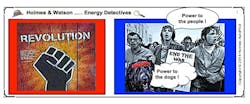Industrial plants need to empower their employees to save power
Watson: In our last two Blogs you talked about what you learned from your first industrial project and how the traditional methods that are used in non-industrial facilities don’t work in industrial plants. What does work?
Holmes: Unlike many non-industrial facilities where the responsibility for the HVAC systems literally lies with the same people who clean the restrooms, industrial plants have qualified personnel who understand and keep all of the production systems operating. They are the experts. It’s their plant. They know every inch of it. They may have installed their largest energy using systems. And they operate and maintain them 24 hours a day. Those people are the key to saving energy. They may not have done much to save energy yet, but they are certainly capable and most are aware of and interested in helping their plant run as efficiently as possible.
Watson: You showed me the email from an energy engineer with more than 30 years of experience in a $5 billion metals company that read,
“Numerous times, salespeople have tried unsuccessfully to promote the “benefits” of energy audits to me. But not one of them had even the slightest understanding of the technology we use! My reasoning was: “How could they possibly suggest any improvements above what I had already done or were, at least, on my radar?” As your article brought out, no one knows the plant as well as the internal operations staff. Thanks for confirming that my ideas are not quite as crazy as everyone else thinks – Cheers”
Holmes: He clearly understands that no outside “Energy Expert” can come in for a few hours or days, do an Energy Audit and tell them how to run their energy systems more efficiently; Even if the Audit addresses the latest “Granular” ways to get “Traction” over their entire “Enterprise”, improve their “Triple Bottom Line”, reduce their “Carbon Footprint” and contribute to “Global Sustainability”. They’ve probably been down that road a time or two before and may be a little skeptical.
Watson: So what is our job? How can we help them?
Holmes: Our job is to learn from them; learn as much as we can about their systems, equipment and processes. We must always very careful right at the beginning of every project, the first time we meet with the people on the floor, the people operating and maintaining the plant and the energy systems, to explain to them what we will be doing to help them do their jobs better. I frequently give them examples of the problems and opportunities we have found in other similar facilities and our methods and results.
I explain how we will not be telling them what to do but be providing the actual monitored energy data they need, in a clear, concise and easy-to-understand format, plus the training and ongoing support to allow them to understand the energy implications of their actions and make their plant run more efficiently.
Although people who have been through previous energy audits or projects that did not deliver as promised are often skeptical at first, nearly all respond to a sincere effort by competent professionals that helps them do their jobs better, provides additional resources to help them and just makes their lives a little better. In our experience this approach has resulted not only in significant energy savings in many different types of industrial plants but in rewarding and long term relationships.
Watson: In other words, give the people running industrial plants the respect they deserve, the information and training they need and get out of their way.
Holmes: You got it Watson.
Tell us about your experiences, both good and bad with energy professionals, what has worked and what hasn’t. Send us your comments, thoughts and suggestions on how to improve our profession so we can all continue to learn from each other. Thanks – Holmes & Watson.
* Comic modified from original accompanying Holmes article "Join the Energy Revolution" in Sustainable Plant Fall/Winter Issue 2012. Read the Article

